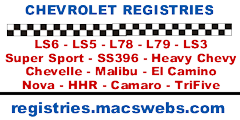1971 Chevelle Warranty Card Protect-O-Plate
|
|
|
|
|
|
|
|
|
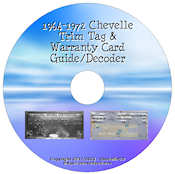
Decode your Protect-O-Plate Warranty card.
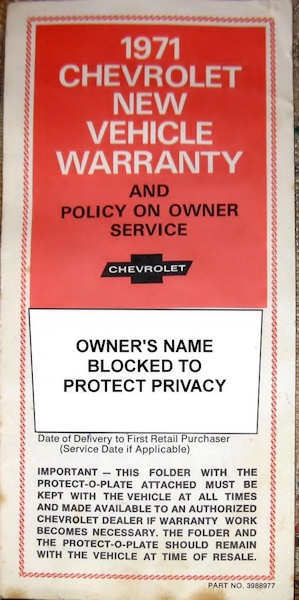
The Protect-O-Plate (P-O-P) was designed to be used by Chevrolet dealers to identify the owner and the vehicle. The owner's name, address and the vehicle's delivery date was embossed on a special tape affixed to the plate.
The P-O-P was glued to the inside rear cover of the "1971 Chevrolet New Vehicle Warranty and Owner Protection Plan" booklet. When warranty service was performed on a customer's car the P-O-P was stamped on the work order.
The P-O-P was never meant to be used as documentation the way enthusiasts today use the card. Then again, the body broadcast sheets, trim build sheets, etc. weren't meant to be used either and were more often than not discarded at the assembly plant. Likewise, the P-O-P was usually discarded when the vehicle went out of warranty or when the car was sold as warranties usually did not go to the new owner.
Today, the P-O-P is one of the best pieces of documentation you can have as it not only identifies the VIN but also the correct engine ID code and date of the engine, the correct transmission number and date along with the rear end gear ratio and date. Some options were also coded on the P-O-P such as power steering, power brakes, radio, air conditioning, etc.
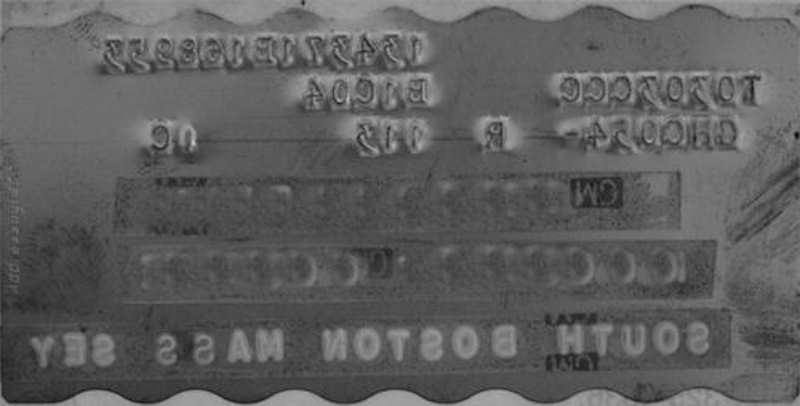
The Protect-O-Plate is located inside the inside rear cover of the warranty booklet. The original stamping is a mirrored stamping, this example is from the Baltimore, MD. assembly plant.
Beware of reproduction (fake) Protect-O-Plates, they can make a put-together Chevelle appear to be authentic. Sellers will even put your name on authentic-looking GM tape. Apparently it's not illegal but any fake documentation is misleading to a potential buyer and, to many Chevelle owners, unethical as well.
This is the above Baltimore, MD. P-O-P mirrored for easy reading.
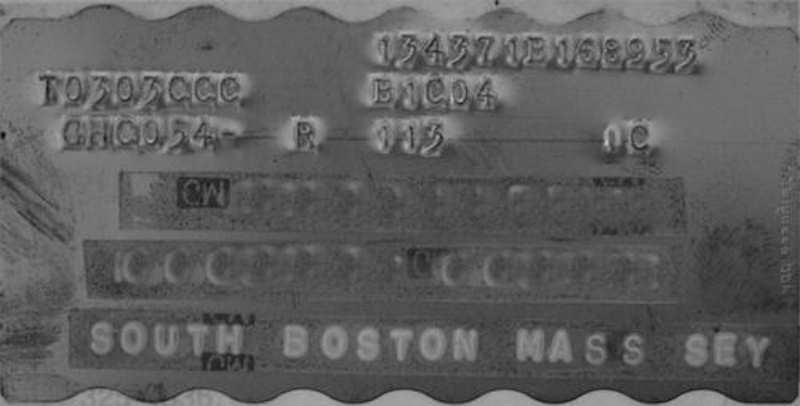
Line 1
* The complete VIN for the car.
Line 2:
*
Engine identification showing the engine plant code ("T" in this
example
for the Tonawanda engine plant), a 4-digit number for the day and month
of the engine assembly, and a three-letter suffix code identifying the
engine size/hp and transmission type. In this example the engine was assembled
at the Tonawanda engine plant on March 3 (1971) and it's a
307cid 200hp engine with
automatic transmission. (1)
* The B1C04 decodes to a Cleveland-built automatic transmission for the 1971 model year assembled on March 4 (1971). (2)
Line 3:
* The rear end ratio, date, and rear end assembly plant. in this
example "CHC" is a Positraction 2.73:1 gear ratio built at
the Detroit Gear & Axle plant, 034- a Julian date counted from the
current model year, 034 is the 34th day of 1971 or the assembly
date of February 3, 1971.
* The "R" is for the carburetor type and in this example it is an
"R" for a Rochester carburetor.
* The number "1" in the first position indicates the car was
optioned with RPO N40 power steering; the number "1" in the second
position indicates the car was optioned with RPO J50 power brakes;
the number "3" in the third position indicates the car was optioned
with either RPO U63, U69, or U79 radio equipment.
*
The bowtie emblem indicates this is a Chevrolet plate.
* The letter "C" is the production month of the car, March of 1971.
(1) Some plants would stamp the 3-letter suffix code
after the plant/date, some stamped it 3-letter suffix code before
the plant/date.
(2) Both the Powerglide and TH350 automatic transmissions
were built at Cleveland and Toledo in the U.S.
Say you saw it here on © ChevelleWorld
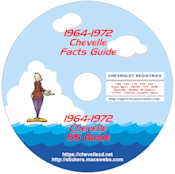
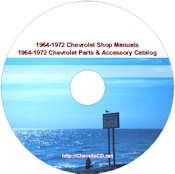

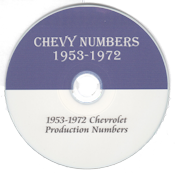
Want more in-depth information on 1964-1972 Chevelles? My Facts and SS Guide
program CD, my Shop Manuals & Parts Catalog program DVD, and my 1964-1972
Trim Tag, Warranty Card program CD and my Chevy Numbers program
CD. Check them and other informative
program CDs at my https://chevellecd.net
website.

 1964 Chevelle
1964 Chevelle 1965 Chevelle
1965 Chevelle 1966 Chevelle
1966 Chevelle 1967 Chevelle
1967 Chevelle 1968 Chevelle
1968 Chevelle 1969 Chevelle
1969 Chevelle 1970 Chevelle
1970 Chevelle 1971 Chevelle
1971 Chevelle 1972 Chevelle
1972 Chevelle


